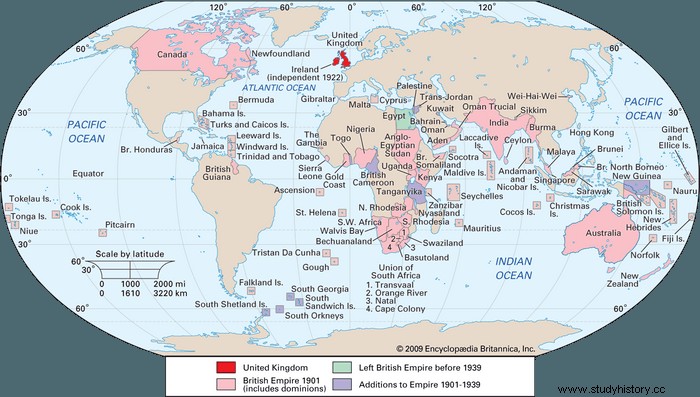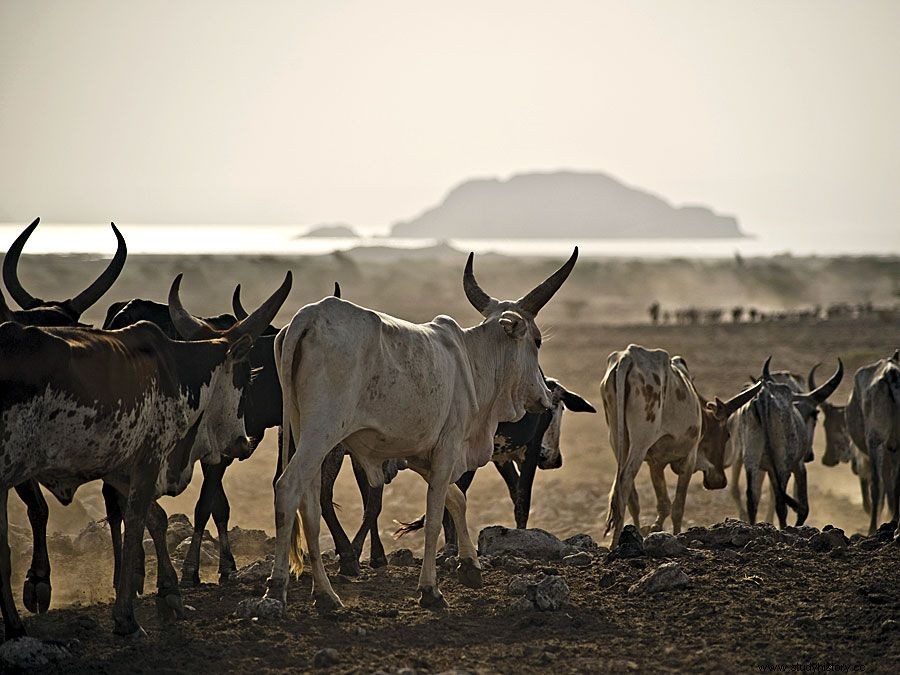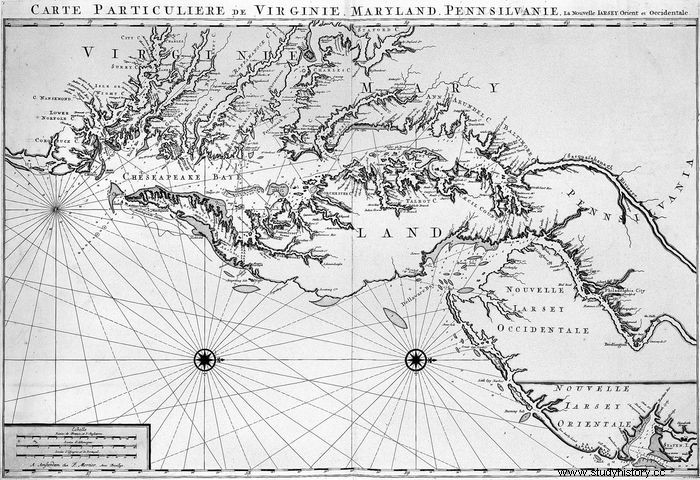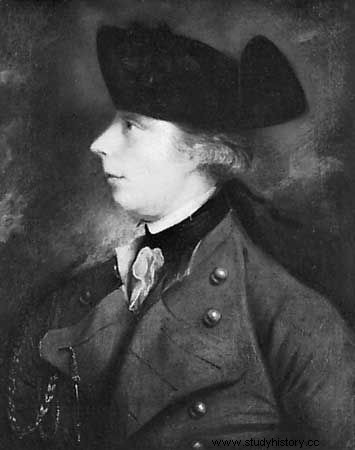
British Empire , a worldwide system of dependencies - colonies , protectorates, and other areas - which, for a period of about three centuries, came under the Sovereignty of the crown Great Britain and administration to the UK Government. The policy of granting or acknowledging significant degrees of self-government through dependencies imposed by the remote nature of the Rich , led to the development of the notion of a "British Commonwealth", , in the 20th century that composed largely of self-governing governing dependencies that recognized an increasingly symbolic British sovereignty. The term was enshrined in law in 1931. Today includes the Commonwealth former elements of the British Empire in a free association of sovereign States.

 Britannica Quiz Destination Africa:Fact or Fiction? Is Africa's northernmost point further north than Europe's southernmost point? See if your geographical knowledge points north or south on this journey through Africa.
Britannica Quiz Destination Africa:Fact or Fiction? Is Africa's northernmost point further north than Europe's southernmost point? See if your geographical knowledge points north or south on this journey through Africa. Origins of the British Empire
Britain made its first tentative effort to establish overseas settlements in the 16th century. The maritime expansion driven by commercial ambition and competition with France , accelerated in the 17th century and led to the establishment of settlements in North America and West Indies . British- existed until 1670 American Colonies in New England , Virginia and Maryland and settlements in Bermuda, Honduras , Antigua, Barbados and Nova Scotia . Jamaica was conquered in 1655, and the Hudson's Bay Company left settled to the northwest Canada from the 1670s. The The East India Company started building trading posts in India in the year 1600 and the Straits Settlements (Penang, Singapore , Malacca and Labuan) became British through an expansion of that company's activities. The first permanent British settlement on The African Continent became 1661 on James Island in Gambia River The slave trade had earlier in Sierra Leone started , but this region did not become British property until 1787. Great Britain acquired 1806 the Cape of Good Hope (now in South Africa) and the South African interior was replaced by Boer and British pioneers under British control open .

Almost all of these early settlements arose out of the enterprise of particular corporations and magnates rather than any effort by the English crown. The Crown exercised some appointing and supervisory powers, but the colonies were essentially self-governing corporations. Empire-building was therefore a disorganized process based on gradual acquisition, sometimes with the British government being the least willing partner in the enterprise.
In the 17th and 18th centuries, the Crown exercised control over its colonies primarily in the areas of trade and shipping. In accordance with the mercantilist philosophy of the time, the colonies were considered the source of the necessary raw materials for England viewed and obtained monopolies in the UK market for their products such as tobacco and sugar. In return, they were to conduct all their trade with English ships and serve as markets for British manufactured goods. The Navigation Act of 1651 and subsequent acts set up a closed economy between Britain and its colonies; all colonial exports had to be shipped on English ships to the British market, and all colonial imports had to come by way of England. This arrangement lasted until the combined effects of the Scottish economist Adam Smith's Wealth of Nations (1776), the loss of the American colonies, and the growth of a free-trade movement in Britain slowly brought it to an end in the first half of the 19th century.
The The slave trade acquired special importance for the British colonial economy in the Americas and became an economic necessity for the Caribbean colonies and for the southern ones Parts of the future United States . movements for the end of slavery realized in British colonial owners long before the similar movement in the United States; Trade was abolished in 1807 and slavery itself in British dominions in 1833.

Competition with France
British military and naval power, under the leadership of such men as Robert Clive, James Wolfe, and Eyre Coote, gained for Britain two of the most important parts of its empire—Canada and India. Fighting between the British and French colonies in North America was endemic in the first half of the 18th century, but the Treaty of Paris of 1763, which ended the Seven Years' War (known as the French and Indian War in North America), left Britain dominant in Canada. In India, the East India Company was confronted by the French Compagnie des Indes, but Robert Clive's military victories against the French and the rulers of Bengal in the 1750s provided the British with a massive accession of territory and ensured their future supremacy in India.

The loss of Britain's 13 American colonies in 1776–83 was compensated by new settlements in Australia from 1788 and by the spectacular growth of Upper Canada (now Ontario) after the emigration of loyalists from what had become the United States. The Napoleonic Wars provided further additions to the empire; the Treaty of Amiens (1802) made Trinidad and Ceylon (now Sri Lanka) officially British, and in the Treaty of Paris (1814) France ceded Tobago, Mauritius, Saint Lucia, and Malta. Malacca joined the empire in 1795, and Sir Stamford Rafflesacquired Singapore in 1819. Canadian settlements in Alberta, Manitoba and British Columbia extended British influence into the Pacific, while further British conquests in India United Provinces brought in Agra and Oudh, as well as the central provinces of East Bengal and Assam.
